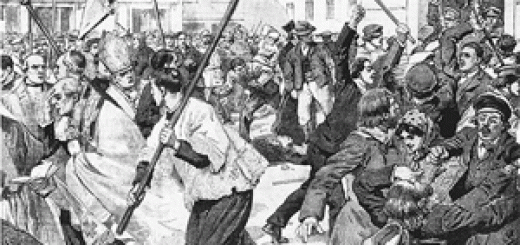What Counts (And What Doesn’t) In A Candidate

Barack Obama is black. Hillary Clinton is a woman. John McCain has hair and is clean shaven. So who’s a balding, bearded Jew like me supposed to support?
If the question strikes you as silly, or worse, you haven’t been paying attention to the media and pollsters. They inform us, and with ample evidence to support the claim, that large numbers of black Americans support Mr. Obama simply because of his color; many women, Mrs. Clinton because of her gender; and many Caucasians Mr. McCain, because of his – well, both.
A recent CNN headline was typical. “Gender or Race,” it reads, “Black women voters face tough choices…” One of the “story highlights” of the featured article amplified: “Women are torn between voting their race or voting their gender.”
Now, it’s certainly understandable that blacks – and, for that matter, we persons of pallor – take pride in the fact that someone of African ancestry is a viable candidate for the highest office in the land; or that women – and men – feel similarly impressed by the fact that a female is the other candidate for the Democratic Party’s presidential nomination. Many Jews, of course, felt no differently about a Jewish candidate – an observant one, no less – when he was a vice presidential candidate in 2004.
Such pride, though, is properly felt not over the candidates themselves but rather over our country and its citizens – for the distance traveled since the days of segregation, disenfranchisement and religious quotas. Maybe there were Jews who voted for Al Gore and Joe Lieberman in 2004 simply because of the latter’s ethnicity. If so, though, they weren’t exactly examples of legendary Jewish intelligence. I actually know more than a few members of the tribe who, embracing the time-honored and never unjustified Jewish trait of nervousness, pointedly voted Republican that year, out of concern that a Jew in high office would become a magnet for Jew-hatred. Most Jews, I hope, simply voted for the candidates they felt were best suited to lead the country – or, at least, the ticket they thought would best address the issues important to them. Needless to say, that is how it should be.
When it comes to charitable giving, of course, it is perfectly proper to favor causes or institutions that benefit one’s family, race, gender or religious compatriots. Even supporting a candidate for office at least partly because one feels that his or her election will benefit one’s particular community is fine. But voting on the exclusive basis of a candidate’s skin color or gender? We have words for that: racism and sexism.
Among the Jewish religious tradition’s sources for priorities in selecting public servants are the guidelines provided by the Shulchan Aruch, the authoritative Code of Jewish Law, for choosing the person to lead the prayer service on special occasions.
Jewish religious law assigns specific gender roles, and, while there have been women prophetesses and judges, women do not traditionally lead Orthodox prayer services. Among men, though, who do, the first and foremost qualification is familiarity with the service and with Scripture. Then come some interesting secondary preferences: someone who has young children at home; and someone living in poverty. The children engender a sense of personal responsibility; the impoverishment helps ensure that the candidate’s prayers will be heartfelt. Then, as the list continues, we find personal piety, a good reputation among peers, modesty; and a pleasant personality. Finally, at the very end of the list, pointedly, comes “a pleasant voice.”
Clearly, what counts most in a prayer leader is the knowledge and ability to do the job professionally. Then come experiences that mold sensitivity and character. It might be a leap to parallel Jewish tradition’s take on prayer leaders with political candidates. But perhaps there is nevertheless some worth in the comparison.
What it would lead us voters to do would be, first and foremost, to consider the candidates’ knowledge and aptitudes. Then, we would be guided to focus on “second tier” concerns. In the current campaign season, that might mean looking at Mr. Obama’s background as a child of mixed race whose parents divorced, who was raised for a while by grandparents and then by a single parent; Mrs. Clinton’s weathering of the brutal world of politics and a challenging marriage; and Mr. McCain’s experience of imprisonment and torture in North Vietnam.
Then there would be the equivalent of a prayer leader’s “pleasant voice.” I’d suggest that it might translate into something similar in a candidate: eloquence in oratory. Nice, but not the most important thing.
But, just like shoe size and eye color aren’t on the list of qualifications for a prayer leader, no one’s list of presidential qualifications should include factors – much less as decisive ones – like race or gender.
© 2008 AM ECHAD RESOURCES
[Rabbi Shafran is director of public affairs for Agudath Israel of America.]




Perhaps I’m being nit picky but actually voting AGAINST someone because of their race or gender constitutes racism /sexism . Voting FOR that person is considered an act of ethnic /gender pride. Perhaps misplaced and a poor choice but not racist or sexist.
Isn’t it accurate to say that a vast majority of Jews, including many Orthodox, still votes Democratic in November, come what may? In one-party towns like NYC or Chicago, the Orthodox politicians all seem to be Democrats, too. The power of rationalization is still great.
What worries me is the following scenario.If Hillary wins the nomination after a bitter campaign, Blacks and young voters will feel cheated and abandon the Democratic Party . We will become like Kenya with two tribes i.e. blacks and youth vs older women and white working class males who say a choice for the other side is not legitimate. We may be heading for dangerous times for our political system. The Obama phenomenon is dangerous if his losing opens a Pandora’s Box. Is there a sense of entitlement that his time has come and we dare not stand in the way.
If this scenario occurs and many politicos are predicting it, we may see massive upheaval in the Democratic Party and the election going to McCain by default. I guess many people see that as a positive outcome.
Rabbi Shafran admits that gender plays a proper role in religious services (and by definition leadership), yet somehow, incorrectly I maintain, concludes that gender should play no role in choosing a national leader.
I think that the Democratic nomination will have to be decided at the convention. I predict that the media will be indignant that they have been shut out of the process after all the work they did brainwashing the voters in the name of democracy. What they will do for sour grapes is try to tell the voters that they were had by the system and shouldn’t vote for the Dem nominee. It may not work. We are overdue for an anti-media backlash. We frum Jews, who don’t have TV and are pretty picky about use of any media, are a lot healthier and freer mentally than most. I, who will not be voting in any US election, will nonetheless be very interested to see how it plays out.
Nit: Lieberman/Gore was 2000, not 2004.
I know this because I remember thinking at the time that had the September 11 attacks occured during a Gore/Lieberman administration, the Jews would have been blamed.
Oh wait, the Jews were blamed.